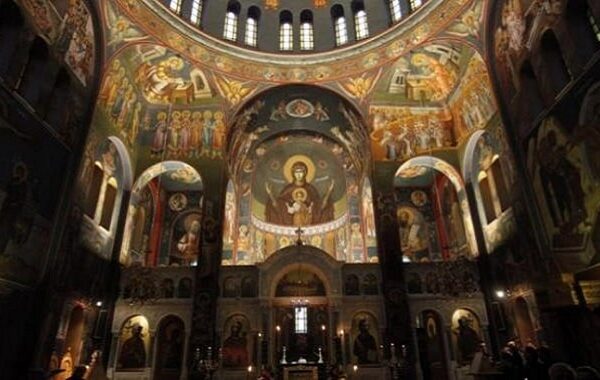They gathered in the church
18 May 2023‘So for a whole year they gathered in the church [assembly] and taught great numbers of people. The disciples were first called Christians in Antioch’.
Throughout the Easter period, we read in church excerpts from the book of the Acts of the Apostles, written by Saint Luke the Evangelist, in which we see how faith in the risen Lord was disseminated, how the first Church was constituted and the reasons why Christianity spread everywhere. One typical example is the evangelization of Antioch, in Syria, a great cultural center, situated near the River Orontes. Now in Turkey, it recently suffered severe damage from powerful earthquakes.

We may note three interesting points in this evangelization, which can also be seen in the context of our own time and reality.
The first has to do with the fact that the message of the Gospels was spread to the Hellenists, the pagans, after the persecution of the Christians on the part of the Jews, following the martyrdom of Saint Stephen, the first deacon and first martyr. This path didn’t open because the disciples were ready for anything like it. A martyr’s death led to it. Great truths. From horrific and unpleasant events, paths to salvation open up for many people. God’s dispensation provides that, through persecutions and sorrows, the faith can be proclaimed in other places, as can love, when those who believe find no response among their own people. Any conclusions about God allowing and tolerating human wickedness shouldn’t be made hastily or categorically. Over time, the presence of God is revealed, often through crosses and sorrows. But the resurrection always comes in the manner which God judges to be best. We need to trust him.
The second has to do with the assembly of people in the church and the ministry of God’s word. The apostles Paul and Barnabas had no qualms about staying in Antioch for a full year. But the center of their life, as is the case of all those who are interested in believing, and in strengthening their faith, is the church. The Christian faith isn’t an ideology or a philosophical topic, but is the mystery of thanksgiving, the Eucharist, the divine liturgy, communion with the body and blood of Christ, which makes people one with God and with other people. That’s where the word of God is taught. It’s from there that the faithful start to live their lives with Christ in their hearts, with love as their compass and with the hope and the light of the resurrection as their expectation. In church, they all listen to the Gospel, resolve their questions, experience the beginning of their spiritual journey, renew their repentance, rejoice in connecting with the persons of their brothers and sisters, decide to forgive, learn obedience from the words of the apostles and fathers, strive to transform their passions into life, celebrate the faith through tradition, and start and end their earthly course. This is of great importance today, when we’ve turned everything into an individual need, even the worship of God, and try to find support in ideologies for what we believe.
The third has to do with the name ‘Christians’. The Jews and idolaters called them this because they viewed them as gullible, stupid, or feeble-minded. In fact, however, the word has a triple root. It expresses the custom of anointing the king in Jewish tradition; the ending ‘-an’ is from Latin; and the ‘Christ’ is a Greek word. Christianity grew beyond its Jewish background, spoke Greek and entered the Roman world and, hence, the whole commonwealth of nations of the time. Ever since, the name ‘Christian’ has continued the tradition of the early Church; it gives us the identity of trust in God and in his will, even during sorrows. At the same time, in the person of Christ, it expresses our hope of eternity in time. It’s the most honorable name we could have and we should be proud of it, in Christ.
May these three points help us to look afresh at our progress in these times, so that we may pore over the life of our faith in the light of the resurrection.
Christ has risen!






